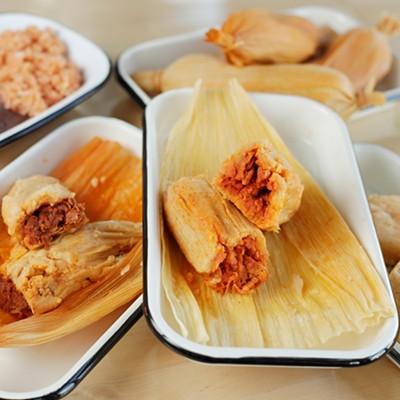
Right next to her plentiful vegetable and herb garden in the side yard of her Spokane home, “Terri” (just the first name, please) raises baby bunnies. She nurtures and cares for the adorable little creatures until they reach the age of 10 weeks.
Then she butchers and eats them. Terri’s a locavore, and for a growing number of city dwellers like her, raising rabbits for meat is one of the latest developments in the movement. While plenty of folks raise their own vegetables, many who enjoy their homegrown food find themselves without meat. Luckily, rabbits are quickly becoming a go-to source for healthy, sustainable and affordable meat.
Terri, who was quick to show off her plentiful larder full of canned rabbit meat, has an ideal home setup, with only three adult rabbits. Lizzie, Molly and Montgomery, the buck and two does that comprise Terri’s breeding stock, are housed in 30-by-36-inch cages, providing them plenty of room to move about during the day.
Terri’s three breeders are her permanent rabbits.
After 10 weeks, when the other rabbits have reached adulthood, Terri butchers the meat at home. “People are surprised when I tell them that,” says Terri. “They say, ‘How can you kill Thumper?’ What I think people don’t realize is how personal a process it is for me. I raise these rabbits from the day they are born, and give each one a happy, healthy life. I pray over each one and thank it for the food it’s giving me. There’s more respect and care in this than any burger or taco at a drive-thru.”
According to the American Rabbit Breeders Association, the American rabbit typically tops out at around 10 lbs., yielding 6 lbs. of lean, high-quality and incredibly healthy meat. Rabbit meat is described as similar to — yet more flavorful than — the dark meat of a chicken. The meat is also so lean that some studies show it to be deficient in fatty acids. Most rabbit ranchers even add fat to the meat when preserving.
What’s more, most families can raise rabbits right out of their own home in the Spokane area. According to the Planning Services Department, rabbits are classified as small animals and allowed in all zones of Spokane. Families are limited, however, to no more than four. To those worried about city restrictions slowing your progress as a weekend rancher, this should not present too much of a problem. Spokane zoning places no restriction on young or small animals less than three months of age, and a litter of rabbits can grow to adulthood in only eight to 10 weeks.
For those interested in raising their own rabbits, there are a few things to consider. Terri’s hand-built side-yard rabbitry takes up 36 square feet, enough room for her nesting cages and a spare for holding during cleaning.
Terri says routine maintenance is crucial, though not terribly time-consuming — 20 or 30 minutes a day. “No more than you’d need to care for a dog,” as Terri says.
Beginning your own rabbit ranch will require a bit of an investment. Terri’s rabbits are fed a diet based on 18 percent protein pellets, a handful of alfalfa hay and a drop or two of mineral oil, all of which can be found at local farm supply stores. Terri also supplements her feeding with herbs and roughage from her home garden. “They like cilantro and mustards, but more than anything, they love the tops of carrots. It’s like rabbit candy,” she says.
Roughage is important to rabbits because, like cats, rabbits clean themselves by licking. However, unlike cats, they can’t cough their fur back up. Terri says when the rabbits go off their eating schedule, it’s a sure sign something is wrong. But a drop of mineral oil on a paw is all it takes to fix them right up.
For those who are hesitant to butcher by themselves, there are local butchers who can handle the messy work for you. To find the one nearest you, visit your local farmers market or hunters supply store and ask around. For the more courageous, however, the ARBA has literature that can guide you, step by step, from buying your breeding rabbits to serving up a pot of rabbit stew. Bon appetit.



















